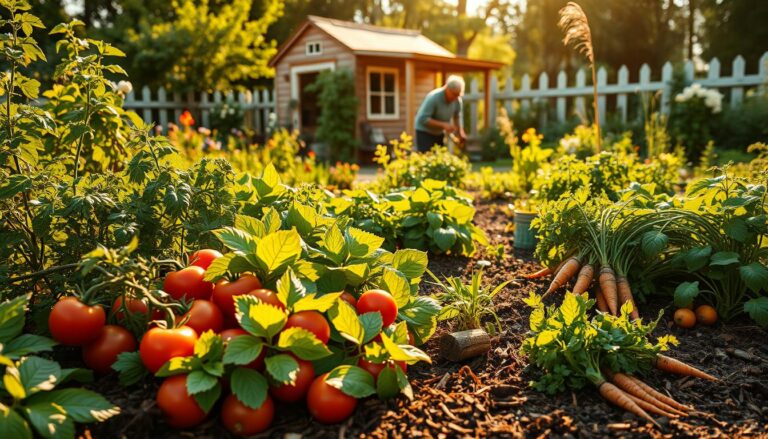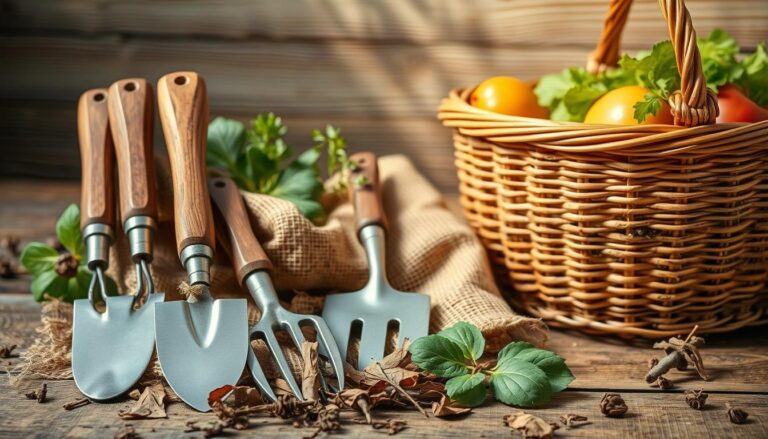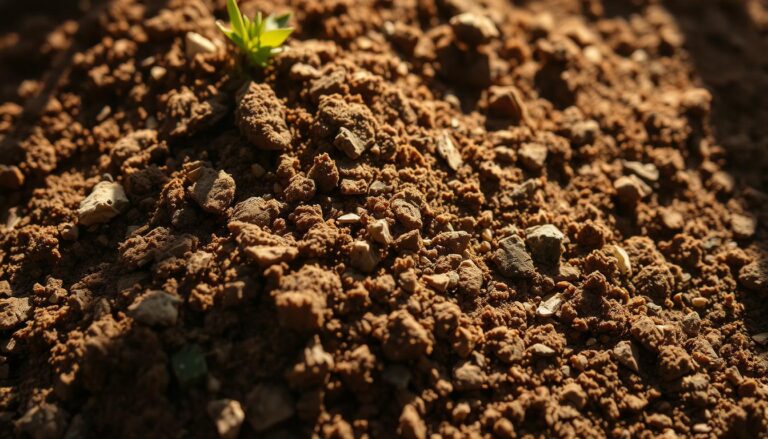Gardening with organic plants needs careful thought about how to feed them. Using eco-friendly plant food helps your plants grow well. It also helps the planet.
Choosing the right eco-friendly options makes your garden healthy and green. This way of gardening is becoming more popular. People want to know how their choices affect the Earth.
Going for sustainable gardening makes gardening more rewarding. It’s about picking the best choices for your plants and the Earth.
Why Your Garden Needs Natural Fertilizers
Using natural fertilizers is more than a trend. It’s key to a sustainable and healthy garden. Organic nutrients help plants grow well and reduce harm to the environment.
Environmental Benefits of Chemical-Free Plant Nutrition
Natural fertilizers don’t harm water or wildlife like chemicals do. They help keep our environment clean. This choice is good for your garden and the local ecosystem.
How Natural Fertilizers Build Soil Health Long-Term
Natural fertilizers improve soil slowly but surely. They make soil better at holding water and air. This helps plants grow strong and healthy.
| Benefit | Natural Fertilizers | Synthetic Fertilizers |
|---|---|---|
| Environmental Impact | Low | High |
| Soil Health | Improves over time | Can degrade soil health |
| Plant Growth | Promotes healthy growth | Quick but potentially harmful |
The Cycle of Sustainable Gardening
Sustainable gardening is a cycle that helps both your garden and the planet. Natural fertilizers make your garden productive and eco-friendly. This includes using compost and manure to feed plants and improve soil.
Understanding Plant Nutrition Requirements
Knowing what your plants need to grow well is key. Plants, like us, need a mix of nutrients to flourish.
Essential Macronutrients: N-P-K Explained
Plants need three main nutrients: Nitrogen (N), Phosphorus (P), and Potassium (K). Nitrogen helps leaves grow. Phosphorus is good for roots and flowers. Potassium keeps the plant healthy overall.
Secondary Nutrients and Micronutrients
Plants also need other nutrients like Calcium, Magnesium, and Sulfur. Plus, they need micronutrients like Iron, Zinc, and Boron. These help with many plant functions.
Recognizing Nutrient Deficiencies in Your Plants
Signs of nutrient lack can show up in different ways. For instance, too little Nitrogen can turn leaves yellow. Not enough Potassium can make stems weak. Spotting these signs early lets you fix problems fast.
| Nutrient | Deficiency Symptom |
|---|---|
| Nitrogen | Yellowing leaves |
| Phosphorus | Purple or reddish leaves |
| Potassium | Weak stems, scorched edges |
The Best Natural Fertilizers for Organic Plants: An Overview
Natural fertilizers are a green way to help plants grow. They give plants the nutrients they need for health. They also make the soil better and help good microbes grow.
It’s important to know the different types of natural fertilizers. Each one has its own benefits.
Slow-Release vs. Quick-Release Natural Options
Natural fertilizers are either slow-release or quick-release. Slow-release types, like compost and bone meal, give nutrients slowly. This prevents too much fertilizer and keeps nutrients steady.
Quick-release fertilizers, like fish emulsion, give nutrients right away. But, they need to be applied more often.
Matching Fertilizers to Plant Types
Each plant needs different nutrients. For example, legumes need more phosphorus, and leafy greens need more nitrogen. Knowing this helps gardeners pick the best fertilizers for their plants.
| Plant Type | Nutrient Requirement | Suitable Fertilizer |
|---|---|---|
| Legumes | High Phosphorus | Bone Meal |
| Leafy Greens | High Nitrogen | Fish Emulsion |
| Fruit Trees | Balanced N-P-K | Compost |
Balancing Soil Ecology with Natural Amendments
Natural fertilizers do more than feed plants. They also make the soil better. This helps create a healthy ecosystem.
Choosing the right natural fertilizers is key. It means knowing the types, matching them to plant needs, and thinking about soil health. This way, gardeners can grow a healthy, green garden that’s good for plants and the planet.
Compost: The Gold Standard of Organic Fertilizers
Compost is seen as the top choice for organic fertilizers. It’s packed with nutrients that make the soil better and more fertile.
Creating Nutrient-Rich Compost at Home
Making compost at home is easy. You just need to gather organic stuff like kitchen scraps, leaves, and grass clippings. These items get broken down by tiny bugs into a nutrient-rich compost.
To make good compost, mix “green” stuff (like kitchen scraps) with “brown” stuff (like dried leaves). Turning the compost pile often helps it break down faster.
Compost Varieties and Their Specific Benefits
There are many kinds of compost, each with its own perks. Vermicompost, for example, is super nutrient-rich. Compost from animal manure is full of nitrogen, phosphorus, and potassium.
Choosing the right compost depends on what your plants and soil need. Some composts work better for certain plants or soil types.
Application Methods for Maximum Effectiveness
Compost can be used in different ways to get the most out of it. You can mix it into the soil before planting, use it as a top dressing, or make a compost tea for plants.
| Application Method | Benefits |
|---|---|
| Mixing into Soil | Improves soil structure and fertility before planting. |
| Top Dressing | Provides slow-release nutrients to established plants. |
| Compost Tea | Offers a liquid solution for foliar feeding, promoting healthy leaf growth. |
Knowing about the different compost types and how to use them can really help your garden. It makes your garden healthier and more productive.
Animal-Based Organic Fertilizers
For gardeners looking for eco-friendly options, animal-based organic fertilizers are a great choice. They come from animals and are full of nutrients. These natural fertilizers help improve soil health and plant growth.
Manure Types: Comparing Chicken, Cow, and Horse
Each type of animal manure has its own benefits. Chicken manure is packed with nitrogen, perfect for leafy greens. Cow manure is nutrient-rich and improves soil structure. Horse manure offers a balanced mix of nutrients.
Bone Meal, Blood Meal, and Fish Emulsion
Bone meal, blood meal, and fish emulsion are also great choices. Bone meal slowly releases phosphorus, helping roots grow. Blood meal boosts nitrogen for lush leaves. Fish emulsion is a quick nutrient source, great as a foliar spray.
Worm Castings: Nature’s Perfect Plant Food
Worm castings, or vermicompost, are top-notch organic fertilizers. They’re full of micronutrients and microbes. These castings make soil fertile and healthy, perfect for young plants.
Using these animal-based organic fertilizers in your garden makes it more sustainable. It boosts your garden’s health and productivity.
Plant-Based Natural Fertilizers
For gardeners looking for chemical-free options, plant-based natural fertilizers are great. They help plants grow well and support sustainable gardening.
Alfalfa Meal and Cottonseed Meal Benefits
Alfalfa meal is packed with nitrogen, phosphorus, and potassium. It’s a balanced fertilizer for many plants. Cottonseed meal is rich in nitrogen and also improves soil quality. Both are great for organic gardens.
Seaweed and Kelp Products for Micronutrients
Seaweed and kelp products are full of micronutrients. They have many minerals and trace elements that plants need. You can use them as sprays or mix them into the soil to boost nutrient absorption.
Cover Crops and Green Manures for Soil Building
Cover crops and green manures improve soil health. They add organic matter, fight weeds, and stop soil erosion. Leguminous cover crops, for example, fix nitrogen from the air, making the soil better for future crops.
In summary, plant-based natural fertilizers provide many options for gardeners. The main advantages are:
- They help plants grow well without chemicals.
- They make the soil healthier with organic matter.
- They support a sustainable and eco-friendly gardening practice.
By using these fertilizers, you can create a balanced and thriving garden ecosystem.
Mineral-Based Soil Amendments
For gardeners looking for green plant feed, mineral-based soil amendments are great. They make soil better for plants and don’t use harmful chemicals.
Slow-Release Nutrition with Rock Phosphate and Greensand
Rock phosphate and greensand give plants slow nutrition. Rock phosphate has lots of phosphorus for roots and flowers. Greensand from the sea adds potassium and other nutrients, making soil better at holding water.
pH Management with Limestone and Gypsum
Limestone and gypsum help control soil pH. Limestone is high in calcium for acidic soils. Gypsum improves soil structure and helps with compaction, without changing pH.
Trace Minerals from Volcanic Rock Dust
Volcanic rock dust is full of trace minerals and silica. It boosts soil health and plant strength. The minerals are released slowly, helping plants grow and soil hold water better.
Using these mineral amendments makes your garden better. It’s good for your plants and the planet too.
Liquid Fertilizers and Plant Teas
Gardeners looking for a quick way to improve plant health find liquid fertilizers and plant teas very helpful. These solutions give plants an instant nutrient boost. This helps plants grow strong and stay healthy.
Brewing Nutrient-Rich Compost Tea
Compost tea is made by soaking compost in water. This extracts good microbes. You need a bucket, compost, and water. Use a ratio of 1 part compost to 5 parts water.
Let it steep for 24-48 hours, stirring now and then. This makes a liquid fertilizer full of nutrients.
The benefits of compost tea include:
- Enhanced soil microbiology
- Increased nutrient availability
- Improved plant disease resistance
Worm Tea and Manure Tea Recipes
Worm tea comes from worm castings and is very effective. To make it, steep worm castings in water like compost tea. Manure tea is also good but must be handled carefully to avoid harmful pathogens.
Here’s a simple manure tea recipe:
- Put manure in a bucket
- Add water to cover it
- Steep for 24 hours, then strain and dilute before using
Foliar Feeding Techniques for Quick Results
Foliar feeding sprays liquid fertilizers on plant leaves. This method lets plants absorb nutrients quickly. Use a fine spray nozzle for even coverage and less waste.
“Foliar feeding can be particularly effective during periods of high nutrient demand or when soil conditions limit nutrient availability.”
Adding liquid fertilizers and plant teas to your gardening routine helps your plants thrive. Whether you’re brewing compost tea, making worm tea, or using foliar feeding, these methods are natural and effective. They help promote healthy plant growth.
DIY Natural Fertilizer Recipes
With a few kitchen scraps and some creativity, you can make your own eco-friendly plant food. This approach not only reduces waste but also provides your plants with the nutrients they need to thrive.
Kitchen Scrap Fertilizers for Zero-Waste Gardening
Turning kitchen scraps into fertilizers is a great way to practice zero-waste gardening. For example, you can create a nutrient-rich liquid fertilizer by steeping vegetable peels in water. Simply collect your scraps in a jar, cover them with water, and let it sit for a few days. Strain the liquid and use it as a sustainable soil amendment.
Custom Blends for Vegetables, Flowers, and Fruits
Different plants have different nutritional needs. For vegetables, a fertilizer high in nitrogen promotes leafy growth. For flowers, a blend with more phosphorus can encourage blooming. Fruits benefit from a balanced fertilizer. You can create custom blends using various natural ingredients like bone meal, alfalfa meal, and kelp powder.
Storage Solutions and Shelf Life Guidelines
When making your own fertilizers, it’s essential to store them properly to maintain their effectiveness. Keep dry fertilizers in airtight containers in a cool, dry place. Liquid fertilizers should be stored in sealed containers in the refrigerator to prevent spoilage. Most homemade fertilizers have a shelf life of a few months to a year, depending on the ingredients and storage conditions.
Seasonal Application Guide for Organic Fertilizers
Knowing what your plants need by season is key to using natural fertilizers well. Each season has its own fertilization needs to keep your garden thriving all year.
Spring Feeding for Vigorous Growth
Spring is when plants need a boost to start growing well. Choose a balanced organic fertilizer high in nitrogen for leafy growth. Compost is great because it gives nutrients slowly, keeping them steady.
Summer Maintenance and Support
Summer is when plants grow the most and need the most nutrients. Use compost tea or fish emulsion for micronutrients. Side-dressing with organic fertilizers around the plants is also good.
“The key to a healthy garden is not just the fertilizer you use, but when you use it.” – Gardening Expert
Fall and Winter Soil Building Strategies
In the fall, focus on making the soil ready for next year. Add compost or well-rotted manure to the soil. For winter, plant cover crops to add organic matter and nutrients.
| Season | Fertilizer Type | Application Method |
|---|---|---|
| Spring | Balanced Organic Fertilizer | Soil Application |
| Summer | Compost Tea, Fish Emulsion | Side-dressing, Foliar Feeding |
| Fall/Winter | Compost, Manure | Soil Application, Cover Cropping |
Transitioning from Chemical to Natural Fertilizers
Switching to green plant growth enhancers is key for sustainable gardening. It’s good for your plants and the planet.
Managing the Adjustment Period
Switching to natural fertilizers can take time. You might see changes in how your plants grow. Be patient and watch your plants closely during this time.
Gradual Implementation Techniques
Start by mixing a little natural fertilizer with your old chemical ones. Slowly add more natural fertilizer over time. This gradual approach helps your plants adjust better.
Rebuilding Soil Biology After Chemical Use
Chemicals can harm soil life. Use compost or manure to fix this. These add good microbes to the soil, making it healthier.
| Transition Technique | Benefits |
|---|---|
| Gradual Mixing | Reduces shock to plants, allows for adjustment |
| Soil Amendments | Rebuilds soil biology, enhances fertility |
| Monitoring | Helps in early detection of nutrient deficiencies |
Conclusion: Nurturing Your Garden Naturally
Choosing natural fertilizers for your garden is a big step towards a sustainable garden. It helps your plants grow well and keeps the environment healthy. Learning what your plants need and picking the right natural fertilizers is key.
There are many natural fertilizers like compost, manure, and plant-based options. Using these can make your soil better, help plants grow stronger, and support local wildlife. Remember, changing to natural fertilizers takes time, so be patient and watch how things change.
By using these green gardening methods, your garden will become lush and full of life. It will grow well without harming the planet. Start using natural fertilizers today and see your garden thrive in a healthy, balanced way.
FAQ
What are the benefits of using natural fertilizers for organic plants?
How do I choose the right natural fertilizer for my plants?
Can I make my own natural fertilizers at home?
How often should I apply natural fertilizers to my plants?
Are natural fertilizers more expensive than chemical fertilizers?
Can I use natural fertilizers on indoor plants?
How do natural fertilizers impact soil ecology?

Sortemdia nasceu com o propósito de trazer alegria e oportunidades para todos por meio de sorteios gratuitos de prêmios incríveis. O site tem como missão oferecer experiências acessíveis, divertidas e justas para quem deseja concorrer a produtos, serviços e brindes sem pagar nada por isso. Acreditamos que a sorte pode bater à porta de qualquer pessoa — e no Sortemdia, ela pode chegar com apenas um clique.



